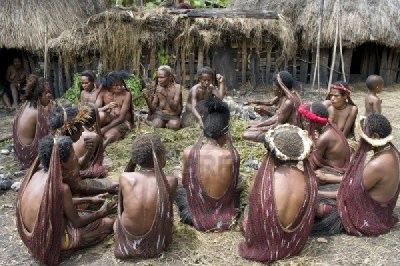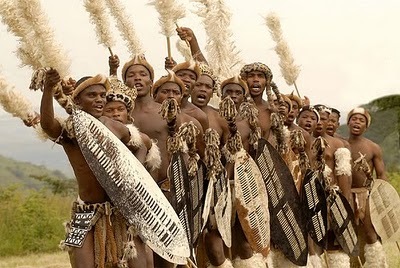
Dispute resolution in traditional societies
 One
of the biggest differences between traditional societies and the state
societies you and I are more familiar with is how people both inside and
outside tribes are treated. Unlike state societies, where you
make friends based on shared interests, friendships
in traditional societies are based on kinship, marriage, and childhood
geography. All strangers
are potentially dangerous, so when two people meet, they may spend
hours trying to figure out if they have a relative in common.
(Appalachia isn't too far off from this tribal focus on kinship. I
can't count how many times strangers have asked me if I'm related to
the Hesses in Honaker. For the record, the answer is no.)
One
of the biggest differences between traditional societies and the state
societies you and I are more familiar with is how people both inside and
outside tribes are treated. Unlike state societies, where you
make friends based on shared interests, friendships
in traditional societies are based on kinship, marriage, and childhood
geography. All strangers
are potentially dangerous, so when two people meet, they may spend
hours trying to figure out if they have a relative in common.
(Appalachia isn't too far off from this tribal focus on kinship. I
can't count how many times strangers have asked me if I'm related to
the Hesses in Honaker. For the record, the answer is no.)
Another important
distinction between state and traditional societies pertains to how
disputes are resolved. In state societies, the government has
taken away individuals' abilities to resolve major conflicts (vigilante
justice), which is both good and bad. On the positive side, state
societies have lower death tolls since wrongs in traditional societies
often lead to warfare, which tends to go on indefinitely due to
tit-for-tat justice. On the other hand, members of traditional
societies have much more of an incentive to resolve conflict in a way
that leaves everyone happy since the other option is war.
 So
how are most conflicts resolved? Unlike the American justice
system, which is based on fairness and guilt, traditional societies
resolve disputes in ways that promote a fast, emotional reconciliation
without an emphasis on right and wrong. The goal is to let the two
parties reestablish their previous relationship so they can live
together peacefully in the future. Diamond suggests that this is
something we should strive to mimic, especially in situations like
disputes between divorcing parents and between siblings arguing over an
inheritance. In modern societies, mediation can yield some of the
same results if done properly.
So
how are most conflicts resolved? Unlike the American justice
system, which is based on fairness and guilt, traditional societies
resolve disputes in ways that promote a fast, emotional reconciliation
without an emphasis on right and wrong. The goal is to let the two
parties reestablish their previous relationship so they can live
together peacefully in the future. Diamond suggests that this is
something we should strive to mimic, especially in situations like
disputes between divorcing parents and between siblings arguing over an
inheritance. In modern societies, mediation can yield some of the
same results if done properly.
Unfortunately, I feel
like many of the social advantages of traditional societies may be
impossible to recapture in our modern world. While I regret living
a distance away from many loved ones, I also wouldn't want to be forced
to settle in town next-door to our family home. I like the way
modern society allows us to be individuals who don't have to cave to
mainstream beliefs, but at the same time, I feel a bit lonely sometimes
when most of my neighbors live in a very different mental world than I
do. Clearly, most of us have been given the choice about whether
to live a more traditional existence, and we've mostly chosen the modern
route instead.
| This post is part of our The World Until Yesterday lunchtime series.
Read all of the entries: |
Want more in-depth information? Browse through our books.
Or explore more posts by date or by subject.
About us: Anna Hess and Mark Hamilton spent over a decade living self-sufficiently in the mountains of Virginia before moving north to start over from scratch in the foothills of Ohio. They've experimented with permaculture, no-till gardening, trailersteading, home-based microbusinesses and much more, writing about their adventures in both blogs and books.
Want to be notified when new comments are posted on this page? Click on the RSS button after you add a comment to subscribe to the comment feed, or simply check the box beside "email replies to me" while writing your comment.

In practice, I think that a kind of "tribal" reconciliation is used sometimes informally, over time, in our society, esp. when limits are clear. (between neighbors, for ex. or on the playing field) But I have no direct experiences of reconciliation between groups people dealing with a some kind of victimization of one group (say from the recent WVa water contamination issue). We do have "class action suits" but not a clear-cut actual reconciliation process.
I think that Mandela was helped by Tutu and others who had learned from their tribes. I remember how amazed I was by a situation in Water-Lily, by Deloria (about a Plains Indian woman's life), when, in a terrible snowstorm the old grandmother tells a long story about a crime of passion that had happened in her youth: as I remember, a man who tried to steal away a woman was murdered by the husband, who then, as the murderer, had to be adopted by the dead person's family, and made to, in effect, replace the dead person in that family! This was a shift, as they were from different tribes. It was decided on by a council of elders. I was so amazed by this I forgot the teller's motive, to impress on Water-Lily that her husband's tribe had to be hers, no matter what he did, or would have to do. The woman in that situation was completely disregarded...